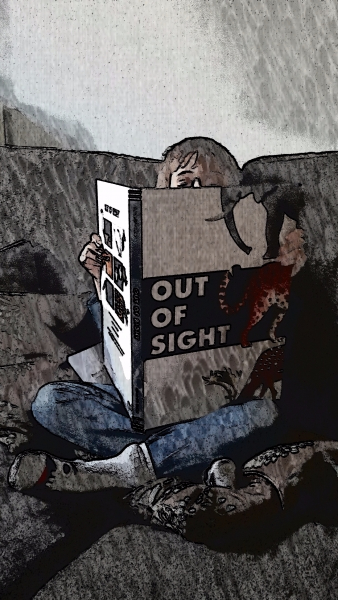Reading is my long-standing rebellion; my nose has barely been outside a book since I learned my ABC. Age seven, I had to be forcibly ejected ‘outside to play’; by ten, I had negotiated a bedroom swap with my brother because a street lamp shone through his window if the curtains were carefully angled. Still at primary school I wrote ‘books’ because I’d read everything in the (very small) mobile library. At eighteen, I managed the ultimate rebellious act: away from home, I could finally read a book whilst I was eating my breakfast. Or my lunch. Or my dinner… I don’t do it so much now; I’ve come full circle in trying to set an example for my own child, but, I can still conjure up that little frisson of daring.
These days – when I’m feeling brave – I call myself a writer, and I like to think the reading has stood me in good stead; everyone knows that writers are constantly exhorted to read, read, read. (And I mean the classics, the bestsellers, the debuts in your genre, not Twitter updates, FB posts or, um, oh dear, blog posts on writing!)
Reading, we are told, not only hones our own story-telling skills, but is essential in understanding the murky world of publishing: what novels are currently selling; why, where and to whom.
It’s a timely reminder. How tempting is it, when immersed in creating your own world to forget about everyone else’s? And in doing that, you can fall out of touch with the reading population. Who cares, you might ask; you don’t want to be fashionable, you just want to write the next great novel. Well, secretly, who doesn’t? And whilst none of us knows what this is, your masterpiece is only in the running if the movers and shakers of reading, writing and publishing agree to read it; you have to get on their radar. Yes, you might, possibly, do that by blazing a trail, but you’re more likely to start out by riding on the tails of other successes.
So, when I’m not writing, parenting, (or updating my social media accounts) I do still read. But what nobody really, truly grasps until they are an author themselves, is that writing ruins reading. Add in the fact that I’m a fiction editor, and a creative writing teacher, and it’s a triple whammy of ruins.
I exaggerate (of course, I do, I’m a writer) but any hobby runs the risk of becoming a chore when it turns into work. Don’t get me wrong, I love all the facets of my job, but I find it harder and harder to read for pure enjoyment. People pay me their hard-earned money to critique, correct and question their stories and help make them the best they can be. I take that very seriously, and the upshot is I read like a writer – and my ‘off’ switch is broken.
In the same way that a restaurant reviewer doesn’t necessarily want to go home and deconstruct her dinner, but to sit, relax and enjoy it, sometimes I just want to be transported by a ripping good yarn, or get the information I’m seeking without analysing text and format. Yet, I find myself examining picture books and rephrasing the words – my five year old son has been known to say, ‘Mummy, stop thinking about the words and read the story.’ I edit the junk mail through the door. I tramp the aisles of the supermarket considering why that cereal packet has that particular blurb. I miss stops on the bus because I’m mentally altering billboards. It isn’t that any of these words – or the novels I do read – are often less than fine, simply that there are endless other options, and I can’t help but wonder.
(It works both ways, of course; come the hour when someone, fair enough, shouts at me – hey, call yourself an editor, what about this, then? – as they brandish my own stories or peoples’ novels I’ve worked on. My only defence is that I do my best, just as everyone else out there is doing. And then I forget the possibility as therein lies madness!)
There’s something else, too. Even when I read a novel purely for pleasure, the writer in me knows how much its author would appreciate a review. Therefore, as I read, I’m formulating my review – and reigning myself in to do it as a reader, not an editor. At this stage, nobody is interested in my suggestions about, say, the structure of the novel or pursuing an alternative Point of View; if they had been they would have asked me to edit it. (The book is published, Anne, get over it). What the writer wants – what I want as a writer – is to know, did the reader enjoy it, why/not and was it a good story, well-written?
What’s my opinion of a great book? Simply the one in which I forget I’m a writer. I forget I’m an editor. When I read and read like I used to do as a child, almost holding my breath to find out what happened next. When it was just one more chapter before bed, where I’d go to dream about my favourite characters – and wonder who were these amazing people called writers?
Then, I’m reading like a reader.
And the rebel reader that got me this far is still going strong.

This post was originally published on The Writing Garnet, Kaisha Holloway's blog - if you're looking for book news and insightful reviews, head over there now: https://thewritinggarnet.wordpress.com/. It's uppermost in my mind again now because I've been travelling with the luxury of a loaded Kindle in tow!


